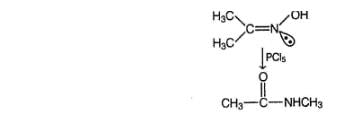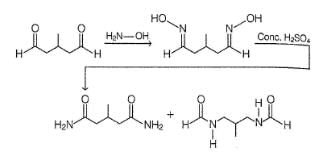Test: Beckmann Rearrangement - JEE MCQ
17 Questions MCQ Test - Test: Beckmann Rearrangement
Only One Option Correct Type
Direction (Q. Nos. 1-7) This section contains 7 multiple choice questions. Each question has four choices (a), (b), (c) and (d), out of which ONLY ONE is correct.
Q.
Which gives more than one amides on treatment with NH2OH followed by PCI5?
Which oximes on treatment with concentrated H2SO4 undergo rearrangement to give single amide?
What would be the major organic product in the following oxidation reaction?

What is the final major product in the following reaction?

What is the major organic product in the following reaction?
One or More than One Options Correct Type
Direction (Q. Nos. 8-11) This section contains 4 multiple choice questions. Each question has four choices (a), (b), (c) and (d), out of which ONE or MORE THAN ONE are correct.
In the reaction given below,

Reagent X could be
Which reaction given below gives 2,2-dimethyl oxirane?
In the reaction given below,
Q.
expected product(s) is/are
The correct statainent(s) regarding the following reaction is/are
Comprehension Type
Direction (Q. Nos. 12-14) This section contains a paragraph, describing theory, experiments, data, etc.
Three questions related to the paragraph have been given. Each question has only one correct answer among the four given options (a), (b), (c) and (d).
Passage
Consider the following sequence of an organic synthesis


Q.
If the starting compound has all its stereoisomers present, how many different oximes would be produced?
Consider the following sequence of an organic synthesis
Q. Which is not a part of neutral products?
Consider the following sequence of an organic synthesis
Q.
What is the possible repeating unit of polymer formed at the end of the reaction ?
One Integer Value Correct Type
Direction (Q. Nos. 15-17) This section contains 3 questions. When worked out will result in an integer from 0 to 9 {both inclusive).
In the reaction
Q.
how many different amides are expected?
In the reaction 
Q.
how many different amides are expected?

Q.
How many lone pair of electrons are present in Y?


















